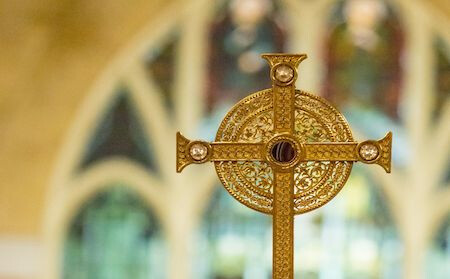The Innocent Curate

The indispensable Richard Mammana wrote recently in The Living Church about a 1963 novel, The Innocent Curate by Parish Leary. It is hard to find, long out of print, and never reprinted. It is also a rich Anglicana delight. But, under the radar, Leary’s project is to subvert the assumptions of the modern reader (and who in 1963 was not a “modern” reader?) that the matters of religion can be entirely accounted for in terms of power, vanity, and psychology. Leary creates a very ordinary (yet peculiar and funny) world into which the transcendent appears uninvited and unexplained.
The Innocent Curate is, apparently, a thinly-disguised tale of life in St. George’s Episcopal Church, Schenectady, New York: the rector and some significant lay people are principal characters, as are Holy Cross Monastery (here “the order of the Divine Ambry”) in Hyde Park, New York, and the General Theological Seminary (here “St. Dismas”) in New York City. Yet its delight transcends figuring out such alleged encodings. It has the period tone of the self-confident Episcopal world in the Northeast, a tone that has not entirely passed away. Indeed, when I lived in the Hudson Valley, one of my colleagues would refer to Roman Catholic churches as “the Italian mission.” Imagine my pleasure to find in this novel a passing reference to Sophie’s slipping out on Sunday mornings to go to the Italian mission.
Right in the midst of this world—an ambitious rector, an overbearing lay woman (“Mrs. O. Felix Cooper”) of massive wealth and ridiculously showy hyper-catholic piety, a conniving church fund-raiser who hates religion, and so on—suddenly one evening, the curate (whom no one ever thought very bright, who was always sincere and a bit simple and is known as “Sonny”), as he is carrying a tray of drinks at a church party, receives the stigmata.
The rector is aghast and instantly fears this will dash any hope of his being elected a bishop. What have you been doing? He accuses the curate of praying too much.
Sonny’s fiancee, Rosemary, who thinks religion is all hokum, decides it’s a psychological illness and gets him to visit a top-notch shrink.
Mrs. O. Felix Cooper comes to him at once, performing double genuflections every two steps as she approaches him. She wants him to become an anchorite at the Divine Ambry, locked up in his cell and never to leave it again.
The fund-raiser sees international fame and mega-bucks in this.
It’s all a delightful mess, but alas the stigmata don’t go away. Sonny just wants to be normal, but he can’t even hold his sweetheart’s hand without it getting messy. He’s bleeding, slowly and not painfully, from his hands, his side, his feet. He’s holed up in the rectory, the rector vainly hoping to keep anyone else from learning about this. The fall passes, and no change. And then it starts to happen.
Sophie and her husband, Oakes, were with Sonny when he first found the stigmata, and as friends they have since tried to offer him moral support. Yet Oakes thinks he has done a very poor job. Oakes is a strange bird: a cultured man of the South with a French wife, who has never been able to make love to his wife. This has to do with an intense relationship he had with two English friends, brother and sister, who died tragically. Oakes is lamenting what a poor friend he has been to Sonny, and what a poor husband to Sophie, when he imagines something that you, my reader, will think crazy. After a mostly silent dinner, after an evening in silence together, Oakes joins Sophie on their couch.
“I haven’t given you much, have I?” he said at length, softly. Oakes thought of the few ghastly times he had tried to make love to Sophie. He had driven himself to do it. . . . He needed desperately what she could give him; and he had failed, in agony and mortification, to obtain it. “It’s because I wanted something from you. I didn’t want to give you anything.”
“And I wanted you to make me love you,” Sophie said, looking down at him, frowning.
“Were we both being selfish?” Oakes asked. . . . “I don’t know if I can love you for myself. I’ve been thinking . . . tonight while we’ve been sitting here. About Rosemary and Sonny. About what we could give them which would help. . . . I think I could make love to you . . . not for me, but, as if you were Rosemary and I were Sonny. They can’t, now, love each other. But we could love for them.”
Rosemary gets it and says “This is a dangerous thing,” and he agrees it could destroy them. Still, they proceed.
The whole thing is wacko—it is thoroughly comedic, and I don’t think Paris Leary quite pulled it off. But what fun these pages start opening up! Leary was onto something deeply true here, a truth of moral theology, and a general truth of all life in the universe. Read it if you can (and don’t worry, there’s nothing remotely pornographic in the account of “Climax Tranquil in Venus”). And then enjoy Oakes’s sudden request of Mrs. Cooper for the loan of her relic of St. Polycarp (his femur!), and the quick race to the end of this delightful book, which shows us that sometimes, for normal life to be normal, God breaks through with something utterly ridiculous to help us see simple things.
For instance, that we find ourselves by giving ourselves away.
---
Out & about. Sunday, July 2, I will be preaching at the traditional services at 7:30, 9, and 11:15 a.m. at Incarnation, Dallas. I will not be preaching on the stigmata.

